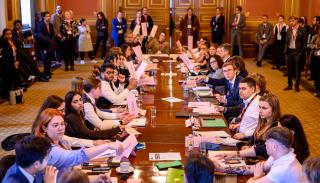
Breadcrumbs navigation
Model NATO - Challenges, skills and preparation
On Wednesday 6 March 2024 approximately 120 participants from 31 UK universities took part in the fifth annual BISA Model NATO. The event is run in partnership with the Foreign Commonwealth and Development Office (FCDO) and took place at its offices in London. Here we talk to University of Sheffield student Petros Polyhronopoulos about the experience, the challenges and skills development.
Which course do you study and what year are you in?
I’m a 3rd year History and Politics student at the University of Sheffield
Which country did you represent?
Luxembourg - I’ll be honest and admit I didn’t even realise it was a part of NATO before learning that we would be representing it. Now I’m its biggest fan. Did you know that, from 2020, their public transport is completely free?
What were the best and also the most challenging things at the event itself?
We really wanted to embody Luxembourg, which was simultaneously the best and most challenging part of the event. I don’t speak Luxembourgish so we were off to a poor start! More seriously, we initially felt constrained by the relatively few resources Luxembourg can offer in crisis scenarios. However, this also gave us the opportunity to be creative and think about what - if not physical resources - Luxembourg can offer to NATO. In doing so, we focused on its historical role as a founding member of NATO and the EU, its strong relationships with powerful states like Germany and the Netherlands, and its tendency towards mediation and cooperation. At the event itself, we were able to leverage these diplomatic ties in order to have an effect far greater than our size would suggest possible; although the resources we ended up committing may not have been significant, we certainly convinced other countries to provide far more.
What skills do you think you developed or had the chance to use as a result of taking part and how will you use these going forward?
It was a truly powerful experience to just be able to work in a building with as much history as the Foreign Office in London. It made all of us feel that, if we put our minds to something, we can achieve it, regardless of our backgrounds. On a more practical level, the location also allowed us to speak to staff at the Foreign Office about their careers and any advice they had. In turn, I now feel far more confident about pursuing a career in international relations. The event itself also helped develop my diplomacy and public speaking under pressure - there were so many new faces on the day and things moved so quickly! More broadly, I think the experience reassured me that sometimes just being friendly and hardworking is enough to be successful. Although I knew less than many at the event, I still felt like I was a meaningful contributor because I was not afraid to work positively with others, and that is a mentality that I hope to take forward in life.
Is there anything you would do differently if you took part in a similar event in the future?
I would focus more on the big picture and the day itself rather than preparing specific information. Particularly, I think our time would have been better spent learning about the interests of other, lesser-known NATO members, as opposed to the significant research we did into the resources available to Luxembourg. Whilst it was important to have a broad sense of Luxembourg’s capabilities in order to work effectively, on the day people were far more interested in knowing about how different members’ interests aligned with one another.


